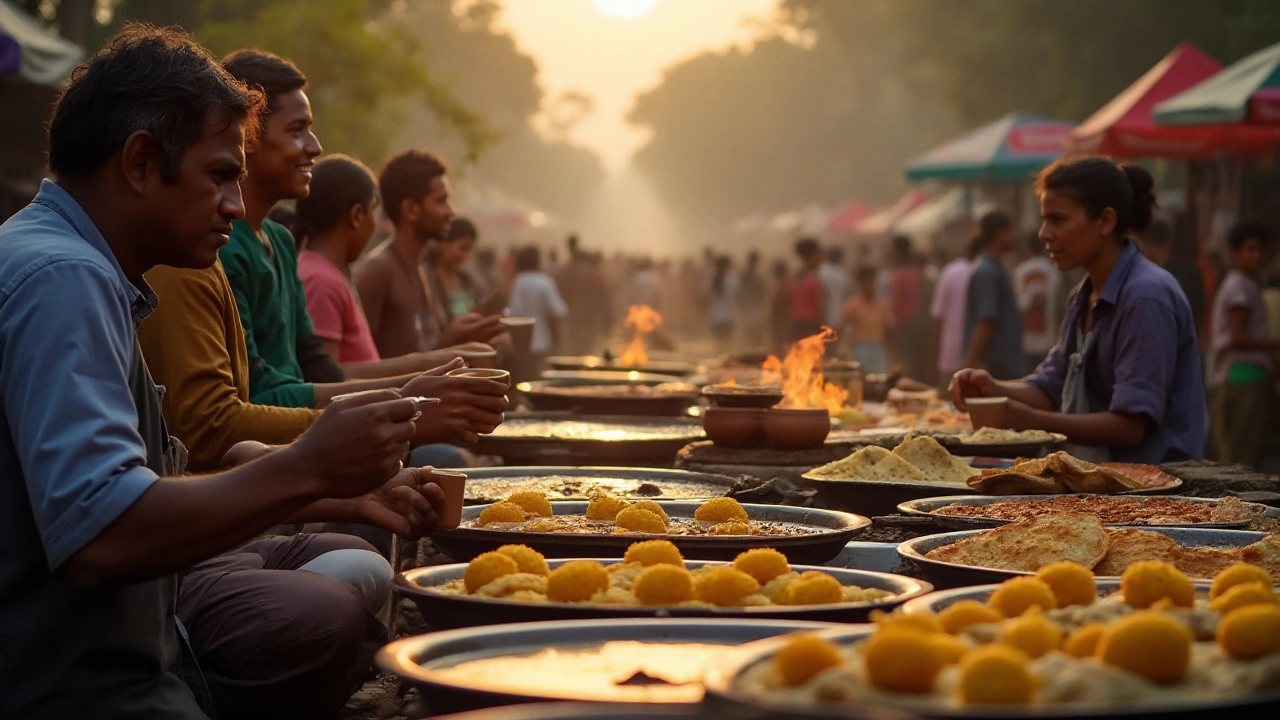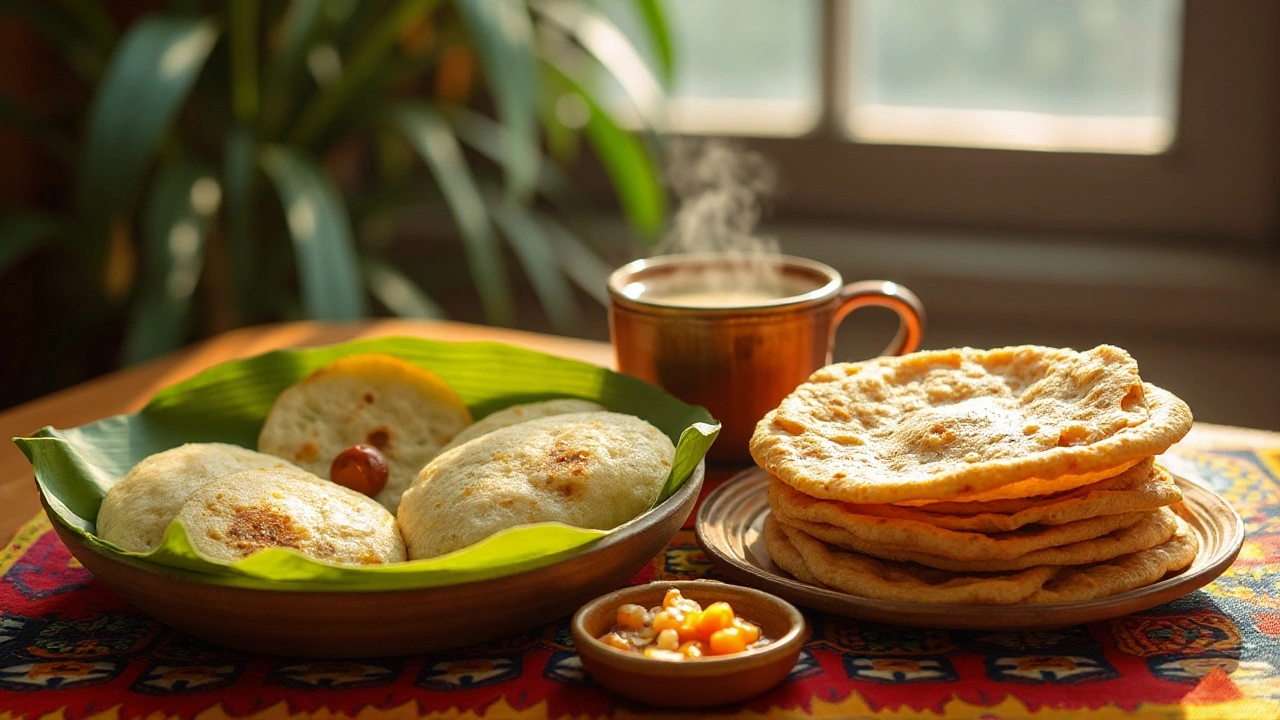5 Dec 2024
- 0 Comments
When the morning sun kisses the vibrant landscapes of India, kitchens come alive with the sounds and smells of a thousand different breakfasts. From the simmering masalas of the north to the coconut-laden delicacies of the south, breakfast is more than a mere meal—it is a celebration of culture and tradition.
This daily ritual varies dramatically across regions, yet each shares a common theme: a heartwarming start to the day. For many, breakfast is incomplete without an indulgence in savory spices, while others prefer the sweetness of traditional sweets. Whether you're a local or a culinary explorer, understanding the subtleties of Indian breakfast can offer a gateway into the country's heart.
Join us on this flavorful journey as we explore some iconic breakfast staples, each with its distinctive taste, method, and cultural significance.
- Regional Breakfast Varieties
- Popular Indian Breakfast Dishes
- Health Aspects of Indian Breakfast
- Ingredients and Spices Used
- Traditional vs. Modern Breakfast Trends
- Quick and Easy Indian Breakfast Ideas
Regional Breakfast Varieties
India's breakfast tapestry is as rich and varied as its cultural landscape. Each region offers a unique morning meal experience, steeped in tradition and local ingredients. In the bustling north, breakfast is a hearty affair, often featuring dishes like parathas, aaloo-puri, and chole bhature. These meals harness the warmth of spices, ghee, and vibrant chutneys that provide energy to tackle the day ahead.
Travel to Southern India, and breakfast transforms into a celebration of subtle yet profound flavors. The iconic dosa, a crisp crepe made from a fermented batter of rice and lentils, is commonly served with a side of sambar and coconut chutney. Idlis, a soft and spongy delicacy, are another beloved staple. Madhur Jaffrey, an acclaimed chef, captures the essence perfectly:
“Indian food is not only peppered with spices, but with the subtlety of centuries.”
The West of India unveils its own breakfast treasures. Maharashtra, for example, offers upma, a savory semolina dish, and poha, a light, nutritious flat rice concoction cooked with turmeric, peas, and peanuts. Travel a bit further and you’ll encounter Gujarat's thepla, a spiced, methi-flavored flatbread that pairs well with chutneys or yogurt.
Eastern India presents a simpler yet delightful start to the day, often featuring luchi with aloo chorchori or panta bhat, a fermented rice dish popular in Bengal and Assam. The versatility of ingredients like mustard, poppy seeds, and the region’s beloved panch phoran spice blend make these meals memorable.
This extensive range of breakfasts across India emphasizes not just varied tastes but also the cultural diversity and culinary heritage of the land. While these meals can differ significantly from one state to another, their role in energizing and delighting millions every morning is universal. Whether you're an enthusiast seeking to indulge in traditional flavors or someone aiming to understand the living habits of this diverse nation, exploring these breakfast dishes offers an immersively palatable journey.
Popular Indian Breakfast Dishes
Across the length and breadth of India, breakfast offerings are as diverse as the country itself. Each dish tells its own unique tale, rooted deeply in regional customs and traditions. Indian breakfast dishes are not only flavorful but also packed with nutrients, offering a perfect start to one's day. In North India, Parathas reign supreme, typically stuffed with fillings like potatoes, cauliflower, or paneer, and served with a dollop of butter or a side of pickles. These are often accompanied by a cup of steaming masala chai, which helps to cut through the richness of the meal. The preparation of parathas is an art, requiring the right balance of dough, filling, and cooking time to achieve that perfect golden crust.
In the southern regions, breakfasts take on a different character with dishes like Idli and Dosa. Fermented and steamed, Idlis are pillowy soft rice cakes served with sambar and coconut chutney. Dosas, on the other hand, are thin, crispy crepes made from fermented rice and lentil batter. Both Idlis and Dosas are integral to the South Indian breakfast table and are celebrated not just for their taste but also for their health benefits, being low in calories and rich in probiotics. It’s fascinating to note the care taken in fermenting these dishes overnight, a process that not only enhances their flavor but also boosts their nutritional profile.
Western India, too, contributes its own specialties, chief among them being the hearty Poha. Made from flattened rice, Poha is cooked with a blend of mustard seeds, onions, turmeric, and green chilies, then garnished with fresh coriander and lemon juice. This dish is not only quick to prepare but also colorful, offering a spicy yet tangy kick that jolts your senses awake. It’s perfect for those seeking a quick breakfast option without compromising on taste.
Venturing towards the eastern part of India, one might find themselves relishing Luchi with Aloo Dum, which is particularly popular in Bengali households. Luchis are deep-fried flatbreads made from refined flour, paired with a spicy potato curry, and enjoyed primarily during weekends or festive occasions. This pairing stands out for its rich and indulgent flavors, offering a glimpse into the region's penchant for celebratory meals.
Each of these dishes requires specific ingredients and spices that are typically fresh and locally sourced, showcasing the natural bounties of the Indian subcontinent. A typical Indian breakfast is not only a treat to the palate but is also designed to keep you energized throughout the morning. In the words of renowned chef Sanjeev Kapoor,
"Breakfast is considered the most important meal across many Indian households as it kickstarts the day with positivity and energy."Such breakfasts ensure that as you move through the day, you are fueled not just physically, but also spiritually, with the love and traditions passed down through generations.

Health Aspects of Indian Breakfast
Breakfast, often hailed as the most important meal of the day, takes on a vibrant and nutritious form in India. The diversity of ingredients used in a traditional Indian breakfast offers a wealth of health benefits. From nutrient-dense lentils and vegetables to whole grains, Indian breakfasts are designed to provide sustained energy throughout the morning. These meals often include a variety of spices known for their medicinal properties. Turmeric, for example, is renowned for its anti-inflammatory effects, while cumin aids in digestion. For many, starting the day with a dish like idli—made from fermented rice and lentils—ensures a good dose of probiotics, supporting gut health.
One cannot overlook the comforting presence of ghee, a type of clarified butter, which is a staple in many breakfast recipes. Though once maligned for its saturated fat content, ghee is now praised for its short-chain fatty acids, which can promote heart health and increase metabolic rate. In fact, research from various nutritionists suggests that incorporating small amounts of good fats like ghee can actually aid in nutrient absorption and satiety. Inland regions emphasize dishes like upma, a savory semolina porridge, which pack in fibers that contribute to digestive health.
"The Indian breakfast is a testament to balance—thanks to its varied components, it bridges the nutritional gaps often left by lunch and dinner," says Dr. Anjali Varma, a leading nutritionist.
While traditionalists may stick to breakfasts rich in carbs and flavors, modern trends in Indian cities have seen a rise in protein-rich options. By adding sprouts, paneer (Indian cottage cheese), or tofu, these meals offer a complete range of amino acids, ideal for muscle repair and growth. It's common to see oats being adapted with Indian flavors—cooked with spices and vegetables, providing a wholesome, heart-healthy start. Moreover, beverages like masala chai and filter coffee provide antioxidants, contributing to a healthy metabolism.
Interestingly, the concept of mindful eating is ingrained in the Indian ethos. Many families dedicate time to breakfast as a communal occasion, allowing them to eat slowly and relish each bite, which aids digestion. A typical morning meal, whether in the bustling streets of Mumbai or the serene countryside of Kerala, is an embodiment of balance, moderation, and variety. It's about using local, seasonal produce, and embracing native superfoods. To better understand, here’s a quick snapshot of some popular ingredients and their health benefits:
| Ingredient | Health Benefit |
|---|---|
| Turmeric | Anti-inflammatory, antioxidant |
| Lentils | Rich in protein and fiber |
| Fenugreek | Lowers blood sugar levels |
| Ghee | Boosts metabolism, aids nutrient absorption |
Whether you're enjoying a spicy poha or a sweet and nutty porridge, the quick breakfast choices in India are rich in both taste and nutrition. These meals not only satiate the palate but are crafted in harmony with age-old principles of Ayurveda, ensuring that food is truly a medicine that nourishes the body, mind, and soul.
Ingredients and Spices Used
Exploring the ingredients and spices behind a typical Indian breakfast reveal the essence of India's culinary magic. Each region boasts its own distinctive palette, creating breakfasts that are universally loved yet locally cherished. Aromatic spices like turmeric, cumin, mustard seeds, and coriander are staples, imparting warmth and flavor to dishes. In the north, dishes like parathas often feature cooked lentils or spiced potatoes, the golden hue of turmeric lending both color and health benefits. Down south, coconut often stars in recipes, shredded, grated, or milked, providing a mild sweetness to dishes like dosa and idli. Rice flour, chickpea flour, and semolina are critical in forming the base of many beloved breakfast items.
Lentils play a central role across the country, packed with nutrients and historically favored for their heartiness. They transform into pulpy sambar served alongside idlis or crispy dosas, a hallmark of southern breakfasts. And then there's the yogurt, rich and creamy, offering a cooling counterpart to spicier dishes. Morning meals often embody the philosophy of healing through herbs and spices, which are believed to stimulate the digestion and invigorate the body's energies.
The humble fineness of cardamom, clove, and saffron in northern India's sweets like jalebi or puris demonstrates sweet notes enhancing the morning table. Sometimes the rituals of breakfast are as much about the ingredients as the preparation itself. A traditional masala chai calls for precise measures of tea leaves and spices simmered to perfection—a daily ceremony imbuing mornings with its distinctive aroma. As the celebrated cookbook author Yamuna Devi once noted, "The spices and aromatics used in Indian cooking are like the musical notes which a cook arranges to create mezzotints of flavor,"
capturing the symphony of tastes that starts with breakfast.
It's not just about hot foods too. Fresh fruits, especially bananas and papayas, are frequent companions in the Indian breakfast ensemble, ensuring that fresh produce graces every table. Indian cuisine's reliance on whole spices, which are often dry-roasted to unleash their full flavor potential, speaks to a long-practiced method of cooking that respects seasonal ingredients and local traditions. Notably, black salt (kala namak), with its sulfurous edge, drastically transforms the taste of fruit salads and chutneys, leaving a tangy finish beloved by so many. Indeed, the spices used in Indian breakfasts reflect the intricate tapestry of cultural influences that have seeped into the nation's borders, ranging from ancient spice routes to colonial exchanges.

Traditional vs. Modern Breakfast Trends
In India, the evolution from traditional to modern breakfast trends highlights a fascinating blend of cultural heritage and contemporary influences. Traditional breakfasts in India are deeply rooted in locally available ingredients and regional cooking styles, each meal serving not just as sustenance but as a ritual that connects families and communities. For example, in the southern states, breakfast is incomplete without steamed dishes like idli and dosa, often served with an array of chutneys and sambar. In contrast, the northern regions might enjoy hearty parathas accompanied by pickles and yogurt, reflecting the high-energy diet suited for the colder climates.
As lifestyles shift towards fast-paced routines, modern breakfast trends have begun to embrace convenience without compromising on taste and nutrition. Influences from global cuisines have introduced options such as cereals, smoothies, and sandwiches, which are quicker to prepare yet offer the same fulfillment as traditional meals. The modern Indian breakfast now often includes fusion dishes that marry recipes from different cultures, such as avocado dosa or quinoa upma, catering to the growing demand for health-conscious yet time-efficient meals. A rise in digital content, like recipe blogs and cooking shows, further encourages this blend by showcasing creative spins on classic dishes.
A key change driver is also the growing awareness around health and diet. Busy urbanites increasingly turn to breakfasts that not only energize their mornings but also align with dietary trends, such as vegan or protein-rich options. A significant 60% of urban Indians reportedly consume breakfast on-the-go, according to a survey by Foodex India.
"The modern Indian breakfast is a canvas of innovation," says Priya Patel, a renowned food historian, "where local flavors meet convenience and health."This quote underscores how the evolving breakfast scene reflects social changes and growing health consciousness.
Despite these changes, many households strive to maintain a balance, savoring traditional breakfasts on weekends when time permits, while adopting quicker options during weekdays. This dual approach allows them to preserve the cultural and familial aspects of breakfast while adapting to the demands of modern life. In essence, India's breakfast trends portray not just a change in dietary habits but an ongoing dialogue between tradition and modernity, where neither truly overshadows the other, but both coexist beautifully to cater to the diverse palate of the country.
Quick and Easy Indian Breakfast Ideas
For many, morning can be a whirlwind of tasks, leaving little time to whip up an elaborate breakfast. Yet, Indian culinary traditions offer a wealth of quick and simple options that seamlessly blend speed with satisfaction. Imagine biting into a freshly prepared paratha, its flaky layers complemented by a side of pickle or yogurt, and you will understand the comforting allure of these meals. One of the most cherished quick breakfasts in North India is the humble poha. Deceptively simple, this dish features flattened rice cooked with spices, turmeric, and often garnished with coconut and fresh coriander leaves, bringing a burst of flavors without requiring much time to prepare.
Moving southwards, the quick-fix breakfast roster includes delights like the easy-to-make upma. Originating from the coastal regions, upma utilizes semolina and a medley of spices, nuts, and vegetables for a filling dish that is both savory and nutritious. With minimal preparation, this dish manages to deliver a hearty meal that satiates hunger while fueling you for the day. Perhaps the most ingenious of these quick breakfasts is the dosa, a delicate crepe made from fermented batter of rice and black lentils. Pair them with coconut chutney, and you have a dish that's as much about convenience as it is about taste.
Making these meals even more accessible, many Indian households have turned to pre-made spice mixes and batters available in supermarkets, allowing quicker meal prep without compromising on the rich, authentic flavors. This trend has democratized breakfast prep, ensuring even those with the tightest schedules can enjoy a genuine taste of India each morning.
To add more diversity to your mornings, here's a simple recipe for a classic, quick Indian breakfast: besan chilla, also known as chickpea flour pancakes. Combine gram flour with an assortment of spices like cumin and coriander, mix in finely chopped vegetables like onions and bell peppers, and simply pan fry the batter until golden brown. In under fifteen minutes, you can enjoy a protein-rich start to your day.
"A recipe is a story that ends with a good meal," remarked culinary icon Pat Chapman, illustrating the joys of bringing such delightful, simple meals to the plate.What makes these meals endearing is not just their speed but their ability to evoke the comfort of homemade food.
Catering even more to those short on time, we see a rising popularity of fusion takes on traditional dishes. From oats porridge flavored with Indian spices to fruit-laden lassis that replace heavier morning fares, these modern interpretations retain nutritional value while offering a faster alternative. Such innovations reflect how Indian cuisine gracefully adapts to the evolving pace of urban life without losing its identity.
